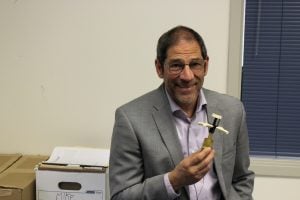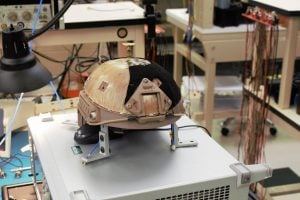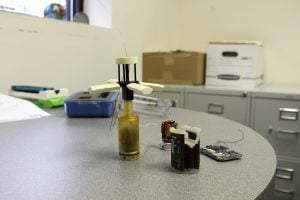
A problem posed and a blank sheet of paper is what Mike Pascale loves most about being an engineer.
Pascale, who received his PhD in Electrical and Computer Engineering from Johns Hopkins in 1996, serves as the CTO for Syntonics LLC., an electrical engineering company based out of Columbia, Maryland. Prior to joining Syntonics, he was the founder and president of ETC-Wireless for 17 years. When the companies merged, it allowed Pascale to get back to his favorite part of being an engineer.
“I like my science, and I like inventing. The majority of stuff I was doing before the merger was research, so this has worked for me,” Pascale said. “We have a detailed process, but my favorite part is at the beginning when it’s up to us to figure out a solution to a problem.”
Recently, Pascale has been heading up development of Syntonics’ Sniper Projected Detection Radar (SPIDR) system, which alerts soldiers to the location of the sniper that hostile fire is coming from. SPIDR distinguishes itself from competitors by being packaged as a lightweight film draped over soldiers’ helmets that weighs as little 100 grams. It provides audio and visual cues that clearly shows a sniper’s location to soldiers, and functions in adverse weather conditions.

Syntonics’ SPIDR system
Another invention Pascale has recently worked with is the Expendable Data Exfiltration (EDEX). The EDEX can detect and send information about underwater activity to a satellite in as few as 10 minutes. Pascale envisions a day when multiple EDEXs could create a pseudo “picket fence” along a coast and help the U.S. Government or Coast Guard with a variety of missions, like detecting the passage of drug running speed boats and mini-subs, the deployment of mines, and illegal fishing operations.
“The idea is that you’d fly a helicopter over and throw them out every 10 miles,” Pascale said. “Each EDEX is equipped with a peg that sticks them to the bottom of the ocean. They could listen for an entire year on a D-size battery. If they detect suspicious activity, a message would go over a satellite where someone in a command center would direct an interdiction.”

Syntonics’ EDEX
Pascale’s invention-making process includes regular communication with some of his professors at Johns Hopkins, especially former adviser Gerard Meyer. In fact, still being able to work with them is one of Pascale’s favorite benefits as a Johns Hopkins alum.
“It’s great having people to collaborate with before I go down a rabbit hole and potentially do something incorrectly,” Pascale said.
Pascale is also looking to hire Johns Hopkins students for summer-long internships with Syntonics. He believes these opportunities could potentially lead to full-time positions for the students.
In fact, he stresses the importance of Johns Hopkins engineering students getting as much real-world experience as possible during their college years.
“Practical experience is a lot easier to come by now than when I was there,” Pascale said. “I’d encourage students to participate in teams where you have a capstone project that is cross disciplinary. Communication skills are essential because the work force is so collaborative, so working in environments that helps you in those areas is key.”